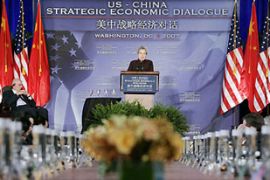China rejects ‘political’ trade row
Report accuses US politicians of using trade disputes as ‘political football’.

The overseas edition of the People’s Daily, seen as the chief voice of China‘s ruling communist party, said China-US trade tensions were becoming dangerously “politicised” amid rivalry between Republicans and Democrats.
The paper cited “rising protectionist sentiment in congress” and proposals to impose tough tariffs on Chinese goods as a way of forcing China to revalue the yuan, making its exports less competitive.
“These congress members have not attained their goal and they will not let matters rest,” said the commentary, written by a researcher at a state think-tank.
“Next year sees the US election, and imbalances in China-US trade may become politicised and a controversial issue during the race.”
Wu Yi, China‘s vice-premier who has been visiting the US for trade negotiations, told US business leaders on Thursday that Beijing was willing to promote flexibility of its currency but would keep the yuan “basically stable at a reasonable, balanced level”.
“China‘s exchange rate reform will be advanced in an orderly way, based on the principles of self-initiative, controllability and gradualism,” Wu said.
Many US politicians and businessmen argue that China‘s currency is undervalued by as much as 40 per cent, giving it an unfair price advantage in international trade.
They say the undervalued yuan is the leading cause of a record $233 bn US trade deficit with China and the loss of millions of US jobs.
‘Watching carefully’
|
“If China and the Bush administration won’t take action to bring about more balance, there is growing sentiment in congress to act” Harry Reid, |
Wu and Henry Paulson, the US treasury secretary, failed to make headway after holding two days of high-level economic talks this week.
In a later meeting at the White House on Thursday George Bush told Wu that the US was “watching very carefully” to see if China would allow its currency to appreciate.
He told reporters after the meeting that the US was “making it clear to China that we value our relationship, but the $233 bn trade deficit must be addressed”.
US legislators have threatened to impose stiff penalties on Chinese imports over the yuan exchange rate, and said they will act with or without support from the White House.
Harry Reid, the senate majority leader who also met Wu, said: “If China and the Bush administration won’t take action to bring about more balance, there is growing sentiment in congress to act.”
During her visit Wu warned that what she called a “rising tide of trade protectionism” would jeopardise the interests of both sides.
She criticised US moves to refer China to the World Trade Organisation for copyright piracy and Chinese barriers to US music, films and books and said the issues should have been resolved bilaterally.
And she repeated China‘s demand that the US end restrictions on exports of advanced technology goods to China.
Ending the curbs, she said, would significantly increase US exports to China, adding that China could not trim the trade imbalance by itself.
In a separate development meanwhile the US has urged China to increase its oversight on the safety of food and drug exports.
The call comes amid growing concern over potentially deadly chemicals added to products such as pet food, toothpaste and fish.